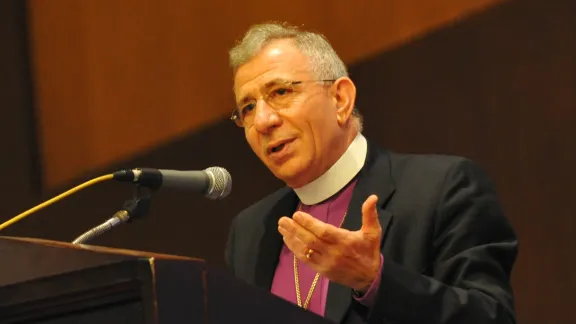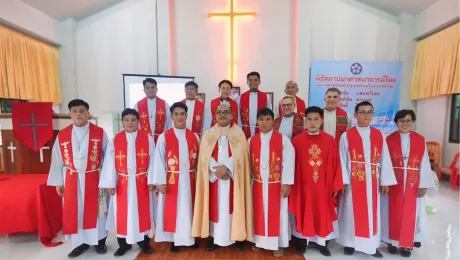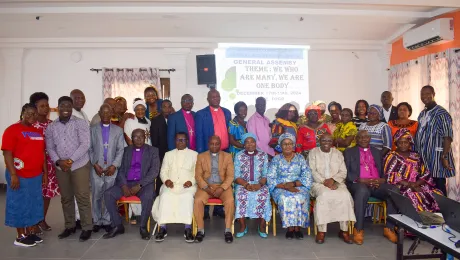
LWF President Bishop Dr Munib A. Younan presents his address to Council 2014 meeting in Medan, Indonesia, 12-17 June. Photo: LWF/S. Lawrence
LWF President Addresses Council
(LWI) – The President of The Lutheran World Federation (LWF) Bishop Dr Munib A. Younan has urged the church to continue working for justice that promotes abundant life for all.
In his address to the LWF’s annual Council meeting at Medan, Indonesia, 12-17 June, Younan noted that tangible faith is rooted in the sacraments of baptism and communion and in the church’s response to the concrete needs of the poor and vulnerable.
Drawing on the Council’s theme “Like a tree planted by streams of water” (Psalm 1:3), the bishop of the Evangelical Lutheran Church in Jordan and the Holy Land (ELCJHL), said the world is thirsting for justice.
“Our world is dying for fresh streams of water that will transform inequality to equality, injustice to justice, egocentric economies to economies of equal opportunity. The church will be prophetic only when it is the voice of the poor, the ones suffering injustice, the occupied, oppressed, persecuted, and displaced,” Younan added.
The LWF president reminded the Council that its theme from the first Psalm not only points to the need for theological renewal but also demands that the church consider questions of justice, particularly as water is becoming a symbol of injustice and inequality.
“Many of us have had the experience of streams of water that have been diverted by more powerful people so that trees downstream do not receive the same benefit. Many of us live in communities where the flowing water is polluted with chemicals, algae, or nuclear waste,” Younan said.
At the approach of the 500th anniversary of the Lutheran Reformation in 2017, which will focus on the proclamation that “we are liberated by God’s grace”, Younan said freedom in Christ binds Lutherans to their neighbors in service.
The LWF’s work for economic justice should not be separated from the growing calls for environmental justice and he linked care for creation to the first articles of the Nicene and Apostolic creeds.
“This is God’s creation and human beings are to care for it; we are to tend God’s beautiful garden. There are times, however, when we can distract ourselves with theological language; it is time that the church speaks plainly about the looming crisis of climate change,” the bishop emphasized.
Churches must raise their collective voice of concern regarding climate change because it is the marginalized peoples of the world who will face the greatest risks as the growing environmental crisis increases the risk of violent conflicts, poverty and economic shocks.
“If we are to be like trees planted by streams of living water, we must do our best to preserve the climate in which those waters flow,” Bishop Younan urged. “Our calling is to be deeply rooted so we can follow God’s law, the law to serve the poor and to shelter the vulnerable.”
While highlighting the growing complications in relations between Christian and Muslim communities, particularly in Muslim majority societies, the LWF president refused to attribute these to theological disagreements between the two faith groups.
He said the tensions must be seen in the context of growing international and economic power struggles and he urged LWF member churches to name and then address these struggles in their own contexts.
Younan said that the vast majority of Muslims are not Islamists and that Muslims and Christians do live together peacefully. Christians who live side-by-side with Muslims need to share stories of these good relationships. Christians are called to witness among Muslims but not proselytize.
“Our witness, faithful to Christ, is one of hospitality and openness, not exclusion and controversy. Our presence in itself is a witness to the Gospel of Christi’s love.”
Bishop Younan said the shooting of schoolgirl Malala Yousafzai of Pakistan in 2012 and the kidnapping of more than 200 girls in Nigeria by the extremist Boko Haram has rekindled LWF’s commitment to education as an evangelical call.
“It is vital that this communion recognize and promote the transformative power of education in each of their societies. This one priority of education encompasses climate challenge and life within and between Muslim and Christian societies.
“Extremists do not want education. They want you to believe blindly and not engage critically. The more you are educated - the more you read – you find that you are small and there is a power in the world far greater than you alone.”
Bishop Younan acknowledged the difficulties the past months have brought to Asia, site of the Council meeting, with the missing Malaysian plane, the Korean ferry disaster, the Nepal avalanche and the landslide in Afghanistan.
He added: “Here, one can find rich and affluent countries immediately next to countries that cannot adequately address needs of their own people. One finds many countries exploited by multinationals and trans-national corporations.”
However, the LWF president emphasized: “We do not prosper until all of us prosper: men and women, north and south, east and west, old and young, rich and poor.”
Council 2014 News | Council 2014 Blog | Council 2014 Documents


